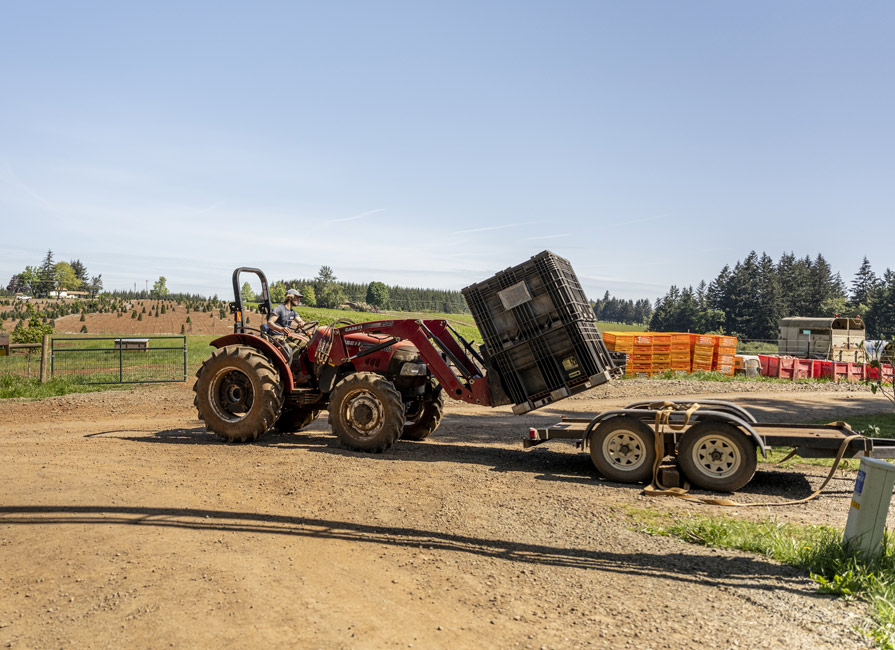One of the key attractions of our Certified Regenerative by AGW program is its practical…

Big Ag’s Gifts for 2016
As many of you know, it’s a tradition of ours to look back over the last 12 months at the many “gifts” Big Ag has bestowed upon us. In most case, they’re gifts we’d probably all like to return… Here’s our top 5 for 2016.
#5 – Big Ag Gets… Bigger
After months of speculation, German-based chemical giant Bayer bought up Monsanto for a cool $56.5 billion. The move follows similar consolidations in the agribusiness sector—including the merger of the U.S. agrichemical giants, Dow and DuPont, in late 2015. If the Bayer-Monsanto deal is approved by regulators, the combined company would be the world’s largest suppliers of seeds and agrichemicals, which raises major issues.
As the New York Times says, “Every merger creates the possibility of higher costs for farmers.” But higher costs for farmers are not the only concerns. Such mergers not only concentrate even more power over global food production to a handful of global corporations, but potentially lead to increased environmental risks for future global food security. As Grist’s Nathanael Johnson says, “The danger is that all these mergers will lead to monopoly and monoculture … That lack of diversity makes us all more vulnerable to climate change, and disease outbreaks.” Thanks, Big Ag.
#4 – Bathroom Bullying
Industrial poultry production isn’t just bad for the farmer, environment, animal welfare or our health: It’s also bad for the people who slaughter and process the birds. Workers on U.S. meat processing lines are among the lowest paid, suffering deplorable and dangerous working conditions, with few rights or benefits. But Oxfam America’s No Relief report reveals a new low: Poultry workers’ requests for bathroom breaks are routinely mocked or ignored, workers are forced to wait up to an hour or more, and requests are often met with threats of punishment or firing. “It’s not just their dignity that suffers,” says Oxfam America. “They are in danger of serious health problems.” Published in May, the report found many workers are forced to urinate and defecate while on the line, wearing adult diapers to work and limiting fluid intake to dangerous levels to avoid the need for restroom breaks.
This appalling treatment isn’t new: In 2013, the Southern Poverty Law Center investigated the impact of increased line speeds at U.S. poultry processing plants, surveying employees at 20 poultry plants owned by eight different companies in north Alabama. Nearly three-quarters of workers had suffered significant work-related injury or illness, including debilitating repetitive stress injuries in their hands, cuts, chemical burns and respiratory problems. Oxfam America’s report calls on Tyson Foods, Pilgrim’s, Perdue and Sanderson Farms to implement immediate changes to improve conditions for workers nationwide. The season of good will to all men (and women)? It “depends” – not if you happen to work for any of these corporations…
#3 — Greenwashing, Continued
Talking of Perdue Foods, the company—one of the nation’s largest poultry producers—triumphantly launch its four-part strategy to address consumer concern about chicken welfare in June. Working with major advocacy groups, such as Compassion in World Farming, Mercy For Animals and the Humane Society of the United States, Perdue published its Commitment to Animal Care: 2016 and Beyond as part of a drive to meet evolving consumer expectations and included plans to retrofit 200 of its 5,000+ chicken houses with windows by the end of 2016 “to compare bird health and activity to enclosed housing,” and improve relationships with its farmers by “creating an open dialogue about best practices.” Perdue will also “investigate” ways to expand Controlled Atmosphere Stunning, currently in operation at one of its 11 plants. But is the announcement all it seems?
Not according to former Perdue farmer, Carole Morison, who appeared in Food, Inc. and now raises Certified Animal Welfare Approved by AGW pastured laying hens at Bird’s Eye View Farm, MD: “Some leading animal welfare organizations have lauded Perdue for its announcement,” she says. “But while I’d love to think the day for real change in industrial chicken production has finally come, I’ll believe it when I see it. Sadly, the reality is that ‘high-welfare’ food has become just another market to capture.”
Here at AGW, we are equally skeptical. In fact, one of our biggest challenges with publicity-seeking announcements like this—and the so-called welfare improvements they promote—is that it misleads the public, giving consumers a false sense that real change is taking place in Perdue’s industrial poultry operations when this simply isn’t the case. While it all might sound good on paper, Perdue’s commitment to welfare reform contains little of actual substance. Thousands of birds will still be raised indoors in total confinement with no guarantee of space to stretch, flap their wings, fly or self-isolate, unable to express key natural behaviors. With such incremental changes, the birds won’t realize their lives are any better. Plus there’s scant evidence we’ll see any improvements in environmental pollution from the barns or the plight of Perdue’s farmers or farm workers. It’s yet another example of Big Ag’s all-out effort to ‘greenwash,’ rather than pursue fundamental changes.
#2 – Dead Bees
In January, the U.S. Environmental Protection Agency (EPA) acknowledged for the first time that one of the world’s most widely used and controversial pesticides can be harmful to honeybees (important pollinators for our food supply) —even at low levels. Imidacloprid was the first neonicotinoid-based chemicals to enter the market and is widely used on cereal and vegetable crops. Every year, U.S. farmers plant millions of acres of crop seeds coated with neonicotinoid insecticides. As the seedlings grow, the plant absorbs the insecticide, protecting it from hungry pests. It is also widely used as a spray.
Environmental groups have long argued that neonicotinoids are harmful to vital non-target inspect species—including the honeybee. Yet despite the ever-mounting scientific evidence of a causal link between the insecticide and plummeting U.S. bee populations, the main neonicotinoid producers have vehemently denied any responsibility, and the EPA has remained largely silent. In other countries, however, regulatory agencies have begun to take action. In late 2013, the EU introduced a moratorium on the use of three neonicotinoids on flowering crops. In November this year, Health Canada—the Canadian EPA—initiated action to phase-out all agricultural and most other outdoor uses of imidacloprid over three to five years.
After years of inaction, the results of the EPA’s field trials finally confirm that imidacloprid can cause honeybee hive populations to fall—even at low levels. But don’t hold your breath: If the EPA is anything like its fellow regulatory agencies, we shouldn’t expect action to control neonicotinoid use anytime soon. The U.S. Food and Drug Administration (FDA) first acknowledged evidence of a causal link between antibiotic abuse in farming and the development of antibiotic-resistant bacteria in 1977. More than 30 years later, the FDA has done almost nothing to control antibiotic abuse in farming and, as you’ll see below, antibiotic-resistant bacteria pose a greater threat than ever…
#1 — Super-Superbugs
In early December, scientists from Ohio State University discovered a dangerous multi-antibiotic-resistant bacteria on a Midwest industrial pig farm. To their surprise, the researchers found bacteria resistant to carbapenem—an important ‘last resort’ antibiotic used in human medicine—on a typical 1,500-sow intensive pig unit.
Known as carbapenem-resistant enterobactericeae (CRE), this was the first time carbapenem-resistant bacteria had been found on a U.S. farm. “Finding CRE at a livestock farm in the U.S. is definitely a concern, and represents another escalation of the antibiotic resistance threat”, said Dr. Thomas Wittum, the lead researcher. Carbapenems are never used in animals intended for food, so how did the resistance occur? One theory is that another antibiotic, ceftiofur, is to blame. Widely used in intensive pig systems to treat piglets, ceftiofur is similar in its antibacterial action to carbapenem. Its use for general disease control may be providing important selection pressure on bacteria that promotes the spread of CRE and other important multidrug-resistant bacteria that can harm humans. It’s yet another example of the unintended consequences of routine antibiotic use.
The identification of carbapenem-resistant bacteria follows hot on the heels of an equally worrying discovery on a U.S. farm. In May, USDA scientists identified a strain of E.coli resistant to colistin, another vitally important ‘last resort’ antibiotic. The frightening thing is this particular colistin-resistant E.coli strain was first discovered on intensive pig farms in China only a few months earlier, revealing the potentially terrifying pan-global public health threat posed by these multi-drug resistant superbugs. As an indication of how important this issue is, all 193 UN member states just signed a declaration to combat the proliferation of drug-resistant infections. Thanks, Big Ag.
—–
But Don’t Lose Hope!
While there undeniably challenges ahead, there are opportunities to engage in creating a food system that benefits us all. In an increasingly deregulated climate, governed by vested interests and with fewer protections for our environment and consumer choice, independent third-party certifications like Certified Animal Welfare Approved by AGW, Certified Grassfed by AGW and Certified Non-GMO by AGW provide much-needed assurances about the sustainability of our food. We are proud to be a source of certainty in choosing meat, dairy and eggs that benefit people, animal welfare, rural communities, local economies and our shared environment. With your support we look forward to continuing this in 2017—and beyond.


